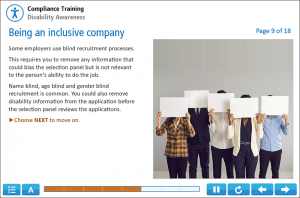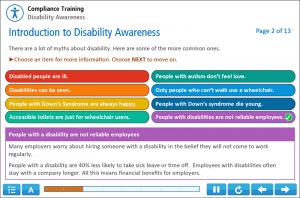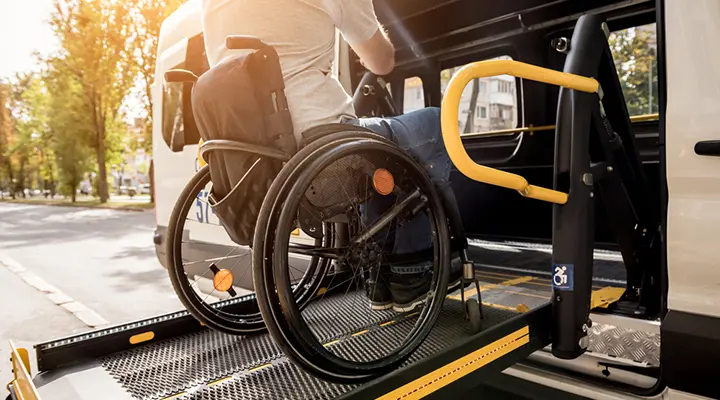There are approximately 16.8 million people with disabilities in the UK – about one in four of the population. Many rely on taxis and private hire vehicle services for essential transport, especially if they are unable to use public transport or don’t have access to a private car. Research by Leonard Cheshire found that millions of disabled people are being cut off from accessible taxi services, highlighting the critical importance of proper training for drivers.
The government wants everyone to be able to travel easily, confidently and without additional cost, and they are working towards this goal. One way to make travel more accessible and safer for people with disabilities is by training taxi and private hire drivers in disability awareness. But are all taxi and private hire drivers legally required to complete this training?
This article will explain whether drivers must take disability awareness training, how it benefits drivers, and why you should choose online training.
Do taxi drivers have to do disability awareness training?
Currently, disability awareness training is not nationally mandatory for taxi and private hire vehicle (PHV) drivers across the UK. However, the Department for Transport recommends it as best practice, and leaves it to the local councils to decide whether they will implement mandatory disability awareness training for their licensed drivers.
Many councils across the UK have already made it part of their licensing conditions, which means drivers in those areas must take the training. However, research shows that currently only about half of local authorities require drivers to undertake training on how to support disabled customers.
Examples of councils requiring mandatory training include:
- North West Leicestershire District Council requires all drivers to undergo Disability Awareness Training during the first year of their licence, with failure to complete training preventing licence renewal
- Cambridge City Council requires drivers to attend a two-hour online training course before taking the knowledge test, with refresher training every three years
- Birmingham City Council and Bradford Council both have specific disability awareness requirements for their licensed drivers
Because licensing rules vary from one council to another, it’s important to check what applies in the area where you work. Visit your Council’s website to find out if your council requires disability awareness training.
Will disability awareness training become mandatory in the future?
While currently disability awareness training is not mandatory for all taxi and PHV drivers, it is likely to become more widespread across the UK.
Advisory bodies such as the Disabled Persons Transport Advisory Committee (DPTAC) are actively calling for mandatory training across all licensing authorities. The Department for Transport continues to issue guidance encouraging local authorities to implement such requirements, and there is a clear pattern of more councils adopting mandatory training policies each year. This suggests that disability awareness training is likely to become a more common requirement across councils and possibly compulsory nationwide in the years ahead.
Why is disability awareness training valuable for drivers?
Whether or not your local council requires disability awareness training, all taxi and private hire vehicle (PHV) drivers can benefit from it.
Here are a few reasons why:
Training helps to build your confidence when assisting passengers with different needs
Training equips you with the knowledge to handle various situations with professionalism and deliver an inclusive and accessible service to everyone. Whether you’re assisting a passenger with mobility difficulties, visual or hearing impairments, or hidden disabilities, knowing how to provide the right support helps passengers feel respected and safe.
For example: Training teaches drivers how to properly assist wheelchair users by asking before pushing their wheelchair, understanding that the wheelchair is part of their personal space, and knowing the correct positioning when loading wheelchair-accessible vehicles to ensure passenger safety and dignity.
Training helps you to understand and fulfil your legal duties when carrying passengers with disabilities

Under the Equality Act 2010 and the Taxis & Private Hire Vehicles (Disabled Persons) Act 2022, drivers must not refuse or discriminate against disabled passengers, must provide reasonable assistance, and must never charge extra for doing so. Failure to comply with these duties can result in fines or even the loss of your licence.
Specific legal examples include:
- You cannot refuse a fare simply because a passenger has a guide dog or assistance dog
- You must help carry luggage and shopping when requested, without charging extra
- You cannot charge additional fees for waiting while a passenger with mobility difficulties gets in or out of the vehicle
Training helps you to improve your service quality
Disability awareness training can significantly benefit your business. By learning about different types of disabilities and how to respond appropriately, you’ll be able to provide a higher standard of service that makes every passenger feel respected and valued.
Real-world benefits include:
- Passengers with visual impairments appreciate drivers who announce their arrival clearly and guide them to the vehicle door
- Passengers with hearing impairments value drivers who make eye contact and speak clearly, or use simple written communication when needed
- Families with disabled children often become repeat customers when they find drivers who are patient and understanding
Passengers with disabilities and their families often become loyal customers when they find a driver who understands their needs and offers reliable, dignified service they can trust.
What are the advantages of doing training online?
Online training offers drivers the flexibility to learn without disrupting work. You can complete the course at your own pace, during quiet periods between rides or in the comfort of your own home. This means you don’t have to give up valuable driving hours to attend in-person sessions.
Unlike classroom sessions, online training is more affordable, you can revisit the course materials any time, and you will receive your certificate immediately after completion. Many drivers find they can complete a typical 2-hour online disability awareness course during their break periods over 2-3 days, making it far more convenient than taking half a day off for classroom training.
Get ahead of the curve with professional disability awareness training
Whether your council currently requires disability awareness training or not, completing this training now puts you ahead of the competition and demonstrates your commitment to professional service.
With more councils implementing mandatory requirements each year, early completion means you’ll be prepared for future licensing changes without the last-minute rush.
Take a look at our Disability Awareness Online Training today!





